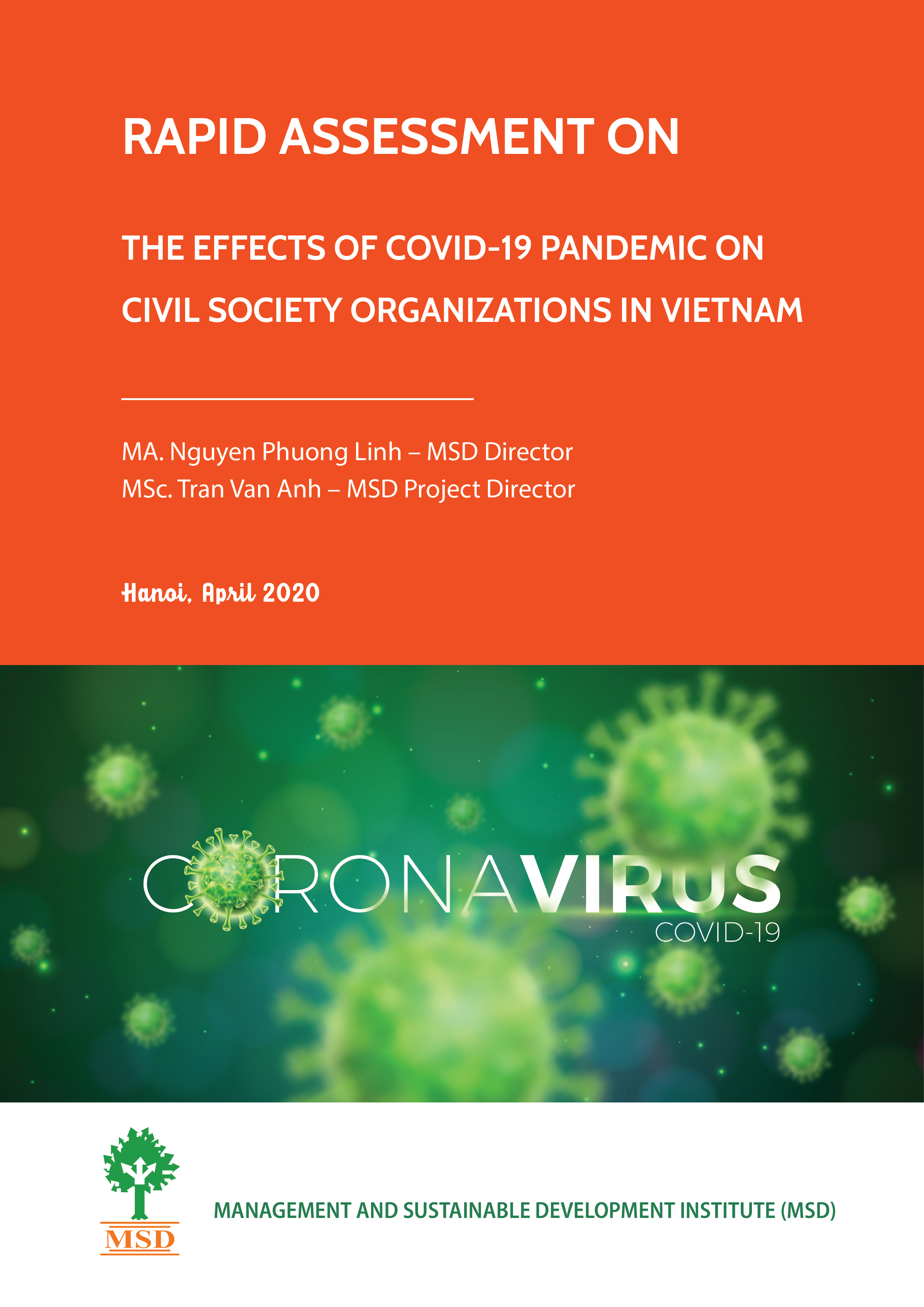

Hanoi, 17 April 2020- Management and Sustainable Development Institute (MSD) today launched its rapid assessment report, “The effects of Covid-19 pandemic on Civil Society Organization in Vietnam”, conducted by M.A. Nguyen Phuong Linh, MSD director and MSc. Tran Van Anh, MSD project director and their colleagues. Completed within only 11 days, from 31 March to 10 April 2020, the report aims to: (1) accessing the levels of effects of the Covid-19 outbreak on civil society organizations (CSOs) in Vietnam; (2) identify challenges and obstacles impeding operations and activities of CSOs; (3) gathering initiatives and solutions on how to overcome the Covid-19 crisis; (4) assessing the CSOs’ demands for strengthening their adaptive capacity and resilience in response to the crisis; and (5) examining how the pandemic exposed children to increased risks. In total, we received 101 responses from different CSOs in Vietnam.
Introducing the report, MSD Director Nguyen Phuong Linh shared: “As considered a third pillar in society, CSOs hold a pivotal role in the country’s socio-economic development, together with the State and business sector. We hope that the survey findings will guide with guide stakeholders in developing supporting strategies and plan for CSOs and help CSOs find their self-reliance and recovery process so that CSOs in Vietnam can continue their missions and take the lead in the field of socio-economic development in Vietnam.”
COVID-19 PANDEMIC – CASTING A DARK CLOUD OVER THE COUNTRY DEVELOPMENT
The report highlights major challenges faced by CSOs in Vietnam during the Covid-19 pandemic as follows:
Delays in operation were the first major challenge confronting most of the CSOs during the outbreak as activities went off schedule and plans developed in January 2020 (before Tet’s holiday) were either canceled or postponed. More seriously, business delays also drove a handful of social enterprises, which work on a non-profit basis, to the verge of permanent shutdown. Education and training programs for youth were suspended.
A funding crisis was the second major challenge confronting CSOs. CSOs anticipated swindling resources due to the economic downturn, therefore CSOs will be cut off from much-needed funds to maintain future activities and services. Conducting research and hosting fundraising activities might no longer be financially viable. Charity centers were forecast to decline by 30% to 40% in revenues.
What is more, the pandemic places difficulties in communication, cooperation, and coordination with partners: Telecommuting or working online may not ensure 100% of work productivity, and it takes a considerable amount of time to arrange online meetings with colleagues and partners.
Challenges in the mobilization of funds include: (1) The post-pandemic economic pains present various challenges in mobilizing resources from the corporate sector; (2) The fields in which CSOs are working may not be the priority of donors in the post-pandemic period; (3) Funding commitments may be broken, withdrawn, or suspended by donors.
Notably, 1 out of 10 CSOs faces downsizing for failing to pay staff’s salary and office rents and lacking technology platforms to operate efficiently in the social distancing.
More than 90% of CSOs cited serious difficulties in serving and supporting their end-constituencies/beneficiaries, especially vulnerable groups. Most of them could not keep in touch with their constituencies during the social distancing or failed to address the changing demands or emergency needs of their clients. “Exercises and therapies for children with cerebral palsy were requested a pause due to the outbreak prevention and control. But they are persons with special needs of medical therapy. Their condition may be worsened without such treatment.”, said a respondent in the survey.
Under 50% of CSOs proposed solutions on how to transform management and operation as well as boost community fundraising and tech applications during the crisis. The survey received merely a few feedbacks on how to maintain their community services during the outbreak;
CSOs’ demands for capacity strengthened to adapt to the new challenges and continue growing. Three major areas in which CSOs wanted to receive support include: (1) accessing funding and resources for CSOs during and post-COVID-19 outbreak, (2) communication and fundraising in the new context, (3) making use of technology for the organization’s transformation;
EVERY DARK CLOUD HAS A SILVER LINING
Based on the survey outcomes, the following main recommendations were proposed to mitigate the corrosive effects of the COVID-19 pandemic:
(1) Strengthening the cooperation between the Government and CSOs in response to the crisis and its resulting socio-economic challenges. CSOs enhance their social oversight of the function of the COVID-19 pandemic, and jointly draft a statement to the government requesting its support for children amid the turmoil;
(2) Strengthening capacity building, and information sharing on contingency plan development, and crisis adaptive capacity enhancement for CSOs;
(3) Researching, and developing strategies for fund mobilization and diversification: emphasizing the importance of strategic partnership with the business sector, and community fundraising to ensure operational efficiency and financial sustainability;
(4) Investing in tech-solutions for the organization’s transformation and improving the efficacy of CSOs in the context of digitalization;
(5) Enhancing CSOs’ network and joint actions to ensure the timely, effective and accountable actions to well respond to the community emergency needs during crisis.
Please see the full report here
For more information, please contact:
Chu Thu Ha – Event and communication officer Email: event.manager@msdvietnam.org
Phone: (+84) 852577220
MANAGEMENT AND SUSTAINABLE DEVELOPMENT INSTITUTE (MSD VIETNAM)